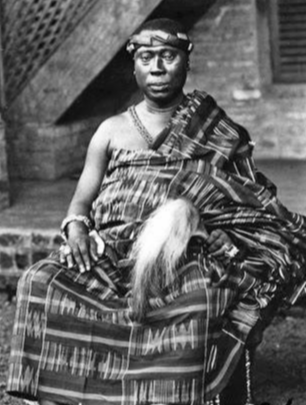Prempeh I was born into the royal Oyoko clan of the Ashanti.
He was selected as Asantehene at a young age after the death
of his predecessor, Asantehene Kofi Karikari. His ascension
came at a time when the Ashanti Empire, once a dominant
force in West Africa, was weakened by internal strife and
external threats.
Upon becoming Asantehene, Prempeh I aimed to restore the
power and unity of the Ashanti Kingdom. However, the British
Empire, interested in expanding its influence in West
Africa, saw the Ashanti as a significant obstacle. The
British had already engaged the Ashanti in several wars
throughout the 19th century, known as the Anglo-Ashanti
Wars, but had not succeeded in completely subjugating the
kingdom.
In 1896, the British, under Governor Sir William Maxwell,
sought to annex the Ashanti Empire. Prempeh I, recognizing
the overwhelming military superiority of the British,
decided to negotiate rather than risk the destruction of his
people. Despite his efforts to maintain Ashanti sovereignty
through diplomacy, the British eventually demanded that he
surrender control of his kingdom. When Prempeh refused, he
and several other Ashanti leaders were captured and exiled
to the Seychelles, marking the end of the Ashanti Empire's
independence.
Prempeh I spent nearly 24 years in exile. During this time,
the British formally annexed the Ashanti Kingdom into their
Gold Coast colony. However, Prempeh I remained a symbol of
Ashanti resistance and pride. In 1924, he was allowed to
return to Kumasi, the Ashanti capital, but not as an
independent king. Instead, he returned as a private citizen,
though he retained significant influence as a cultural and
spiritual leader of the Ashanti people.
Prempeh I's return to Kumasi was met with great celebration,
and he spent the remainder of his life working to preserve
Ashanti traditions and culture. He passed away in 1931, but
his legacy lived on. His reign, despite the challenges, is
remembered for his efforts to protect the sovereignty of the
Ashanti people and his resilience in the face of colonial
pressures.

